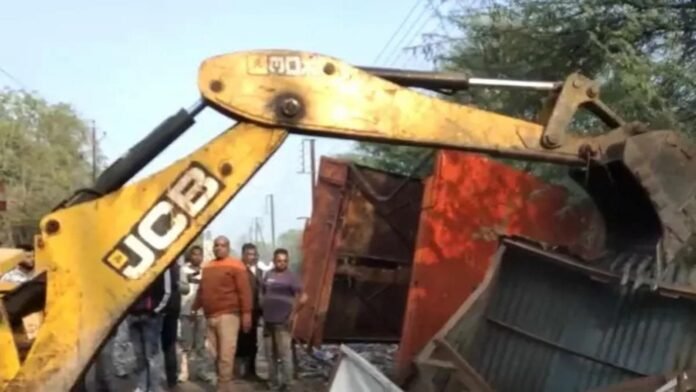Are bulldozers replacing due process in India? A constitutional analysis of demolition drives, arbitrary action, and erosion of legal safeguards. | The Legal Observer
When governments punish with demolition before a court rules guilt, the bulldozer replaces the Constitution as the final arbiter of justice.
The Indian Constitution, in its vision, is a charter against arbitrary power. It guarantees due process, the presumption of innocence, and the right to life with dignity. But in today’s India, a new symbol has emerged — the bulldozer — cutting across rubble and rights, often operating before a court of law does. Once a tool for municipal cleanups, it is now seen in prime-time spectacles, razing the homes of the accused — not the convicted — in the name of “zero tolerance” for crime.
This isn’t just demolition. It’s a legal and moral collapse.
🔨 From Urban Planning to Public Spectacle
In the past three years, various state governments — notably in Uttar Pradesh, Madhya Pradesh, and Delhi — have used bulldozers to demolish houses and commercial properties of individuals accused (not convicted) of criminal offences. These have included:
- Alleged rioters
- Gang suspects
- Protest participants
- Political dissenters
The pattern is unsettling: a person is accused of wrongdoing, often in volatile or politicised contexts, and within days, the state acts — not through courts, but through earth-moving machinery.
This spectacle has been widely televised. Bulldozers have become both theater and threat, carrying the message: justice will be instant, and irreversible.
⚖️ What Does the Law Say?
India’s legal architecture provides several protections against such actions:
- Article 14: Guarantees equality before the law and prevents arbitrary state action. Selective demolitions violate this principle.
- Article 21: Protects life and personal liberty, interpreted by courts to include the right to shelter, due process, and dignified living.
- Article 300A: States that no person shall be deprived of property except by authority of law.
- CrPC & Municipal Laws: Demolition for encroachment must follow notice, hearing, and remedial opportunity — not sudden punitive action.
In Maneka Gandhi v. Union of India (1978), the Supreme Court held that procedure must be fair, just, and reasonable — not arbitrary, fanciful, or oppressive.
🧑⚖️ What the Courts Are Saying
In recent cases, Indian courts have issued cautious responses:
- In 2022, after communal tensions in Khargone (Madhya Pradesh), the Supreme Court refused to stop demolitions, but did ask the state to act as per “due process of law.”
- The Allahabad High Court, in another context, stated: “No property can be demolished as a punitive measure without adherence to law. Even an encroacher has a right to be heard.”
However, courts have often stopped short of constitutional condemnation, avoiding a firm line against demolition as punishment.
📉 The Dangerous Shift: Accusation = Guilt
Perhaps the most alarming element is the substitution of accusation for conviction. In a criminal justice system built on innocent until proven guilty, bulldozer justice turns that standard on its head.
“The state cannot assume the role of judge, jury, and executioner,” notes Advocate Shreya Malik, a Delhi-based constitutional lawyer.
“Demolition without trial is a form of collective punishment — incompatible with democratic governance.”
This doctrine undermines:
- Judicial supremacy
- Natural justice
- Principles of proportionality
The result is a two-track justice system — one for the privileged, the other for the politically inconvenient or socially marginalised.
🏘️ Whose Homes Are Being Demolished?
Activists have pointed out that the targets of such demolitions are disproportionately from Muslim communities, Dalits, and poorer social groups. Whether intentional or systemic, the pattern raises questions of discriminatory enforcement, which directly violates Article 15 of the Constitution.
“Demolition as retribution disproportionately affects those who lack the means to challenge the state — it’s punishment by poverty,” says Afsar Khan, a housing rights activist in Lucknow.
This makes the bulldozer not just a machine, but a symbol of selective governance.
🚨 Due Process is Not a Luxury
Governments often argue that demolished structures were unauthorised or encroachments. But legal scholars point out: even an encroacher is entitled to notice and hearing.
In Olga Tellis v. Bombay Municipal Corporation (1985), the Supreme Court famously ruled that pavement dwellers have a right to be heard before eviction, connecting shelter to the right to life.
Using illegal construction as a post-facto justification for punitive demolitions — especially without notice — undermines this landmark precedent.
🧱 What Should Be Done?
- Clear Judicial Guidelines: The Supreme Court must lay down non-negotiable safeguards — including notice, independent oversight, and legal remedies before any demolition.
- Legislative Oversight: Parliament and state legislatures should consider laws regulating demolitions during criminal investigations, with a high threshold for urgent action.
- Accountability Mechanism: Public officials ordering demolitions outside legal framework must be made personally accountable.
- Human Rights Commission Intervention: NHRC and SHRCs should proactively investigate and recommend safeguards against extrajudicial demolitions.
🏛️ Democracy at the Breaking Point
The image of a bulldozer tearing through a home — while criminal charges are still pending — does not reflect strength. It reflects fear of due process, and lack of faith in the judicial system. It replaces the calm deliberation of justice with rage and performance.
In the long run, the cost is not just to the individual — it is to the Constitution itself.




